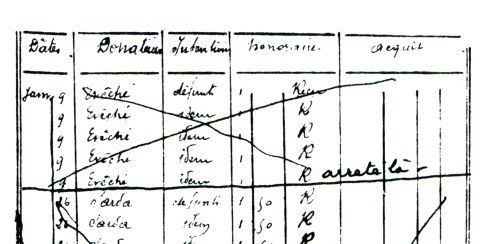The beginning of mass traffic (1893-1894)
From HERE
The material is distributed under a Creative Commons BY-NC-SA 4.0 license
With many thanks for Mariano in giving me permission to reproduce his excellent researches!
During 1893 the demands for masses increase more and more; as a result, and it is detectable from the reading of the reports, Saunière is constantly behind in keeping to its commitments1: the masses requested in September 1892 are celebrated only in July 1893! To make up for the ever-increasing delay, the parish priest of Rennes-le-Château is forced to compromise: he decides, therefore, to celebrate masses for three intentions at a time, thus violating the limit imposed by ecclesiastical law2. On January 9, 1894 he is celebrating, three at a time, the masses requested in September of the previous year: that day he decides to stop. He pulls a clear line on his register and writes: "Arrêté là" (I'll stop here).

Bedu writes that Saunière not only draws a line on his register "but also on his honesty and integrity as a priest. It chooses the easiest way, that of mass traffic. While continuing to say some sporadic mass, he will dedicate himself to sending numerous letters that will allow him to accumulate the money necessary for the construction of his estate. Once we set up this activity and start the mechanism, it will be difficult to stop it and we will see later that it will backfire on him"4.
Saunière would have had other chances: he assigns the surplus intentions to other priests in the area; this would have forced him to pay them also the sums received for the masses in question. When he is formally accused of mass trafficking, the curate will claim that he has actually entrusted the excess celebrations to other priests, but will not be able to prove it except by citing deceased priests...
1. In Jean-Jacques Bedu, Rennes-le-Château, autopsie d'un mythe, Loubatières, Portet-sur-Garonne 2002, p. 132 it is said that Saunière is ten months late, thus interpolating: "This means that in July 1893 he said the masses of May 1892". Actually between May 1892 and July 1893 there are fourteen months. If we keep the delay of ten months good, we must conclude that in July 1893 he was reciting the masses of September 1892".
2. Claire Corbu, Antoine Captier L'héritage de l'Abbé Saunière, Bélisane, Nizza 1995, p. 190 and Bedu 2002, p. 137-138. Today's Code of Canon Law (c.953) prohibits receiving offers for a mass that will not be able to be celebrated within the year.
3. Corbu/Captier 1995, p. 190.
4. Bedu 2002, p. 136.